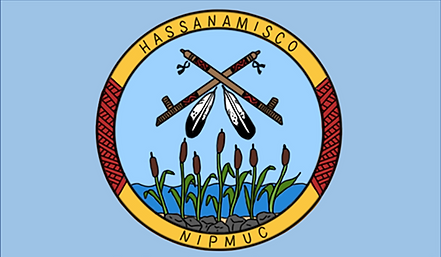Shrewsbury
Historical Society
Established 1898
Mario - Fats - Caruso
1928 - 1993
Mario - Fats - Caruso
1928 - 1993

Mishoon Burning, Oak Island, 2024
Nipmuc Tribe
The Nipmuc Tribe are an Indigenous people native to central New England, specifically Massachusetts, northern Rhode Island, and northeastern Connecticut. The name “Nipmuc” comes from the Algonquian language, meaning "people of the fresh water."
Before Europeans arrived, the Nipmuc had inhabited the region for thousands of years, cultivating deep relationships with the lakes, rivers and forests. They lived in villages and seasonal camps, moving with the cycles of the land.
They grew the “Three Sisters” — corn, beans, and squash — and were skilled in woodland hunting and fishing with tools like bows, spears, and fish traps. Nipmuc villages had a strong community structure. Each had a sachem, or chief, and decisions were made through consensus among tribal elders and leaders. Their society was spiritually rich, with beliefs deeply tied to nature and the land.
When Europeans arrived in the 1600s, the Nipmuc were among the many tribes that suffered due to disease, war, and loss of land. During King Philip’s War (1675–1676), a conflict between Indigenous peoples and English settlers, many were killed, enslaved, or forced to live on small land parcels or blend into other communities.
Despite centuries of hardship, the Nipmuc Tribe has endured and continues to preserve their culture and identity. The Hassanamisco Reservation, in neighboring Grafton, Massachusetts, is one of the oldest continuously held Indigenous lands in New England, and a core cultural site for the tribe. It holds deep historical and ceremonial importance and serves as a center for education, cultural preservation, and community gatherings.
.png)
Nipmuc culture today is celebrated through language revitalization, traditional crafts, oral storytelling and educational outreach. Tribal members continue to practice traditional arts like beadwork, basket weaving, and drumming, while also engaging modern society through education and activism. The tribe works to protect sacred sites, reclaim ancestral land, and pass on knowledge to future generations. [1]
(1) Who are the Hassanamisco Nipmuc Band? (Hassanamisco Nipmuc Band, 2025) https://nipmuc.gov/who-we-are-2/